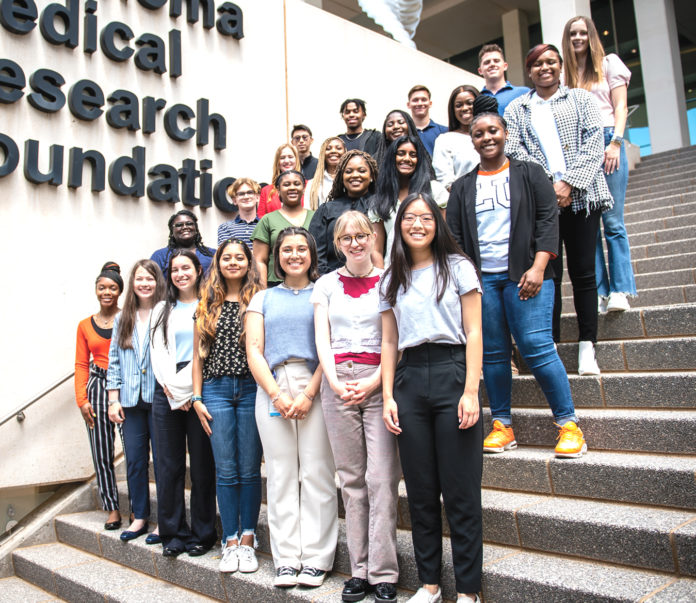The Oklahoma Medical Research Foundation hosted a record intern class this summer as students conducted wide-ranging experiments while working alongside some of the top minds in science.
Twelve students formed the 66th class of the Fleming Scholars Program. Nine more made up the second class of the OMRF-Langston University Biomedical Research Scholars Program.
The Fleming program gives Oklahoma high school and college students hands-on biomedical research experience. It is named for Sir Alexander Fleming, the British scientist who discovered penicillin and in 1949 came to Oklahoma City to dedicate OMRF’s first building. (story continues below)
Fleming Scholar Michael Dong of Edmond, a chemistry and neuroscience major at Rice University, was surprised at his ability to comprehend his assigned experiments investigating blood clots at the molecular level. He spent his summer working under OMRF cardiovascular biologist Lijun Xia, M.D., Ph.D. “The Fleming experience has only further confirmed my dream of pursuing a career intertwining scientific research and medicine,” Dong said.
More than 600 Oklahoma students have participated in the Fleming Scholar program since its inception in 1956. Two current OMRF vice presidents, Judith James, M.D., Ph.D., and Rod McEver, M.D., started their research careers as Fleming Scholars.
The Langston Scholars program aims to diversify biomedical research in Oklahoma. Inaugurated in 2021, it is a partnership between OMRF and Langston University, Oklahoma’s only historically Black college or university.
J’Taelii Heath, a biology major at LU, said the experience was a lesson in patience and persistence. “It’s not just a matter of doing an experiment and being done with it,” said the sophomore from Oklahoma City. “You have to repeat the same experiment to show consistent results.”
Heath’s research in the lab of OMRF scientist Bob Axtell, Ph.D., found that a component of black pepper reversed the inflammatory effects of cigarette smoke. This finding could have significant implications for people with multiple sclerosis, whose prognosis worsens from smoking.
Other Langston and Fleming Scholars conducted research in areas ranging from osteoarthritis and cancer biology to diseases of aging. At the summer’s conclusion, each authored scientific papers and delivered presentations to OMRF’s research staff.
Additionally, four students from U.S. service academies comprised the 12th class of the John H. Saxon Service Academy Summer Research Program. The 25 total students marked the largest group of summer program participants in OMRF’s 75-year history.
Applications for OMRF’s 2023 Fleming Scholar program will open in fall 2022. For more information about education and outreach programs at OMRF, visit
www.omrf.org/about-omrf/education-outreach.













